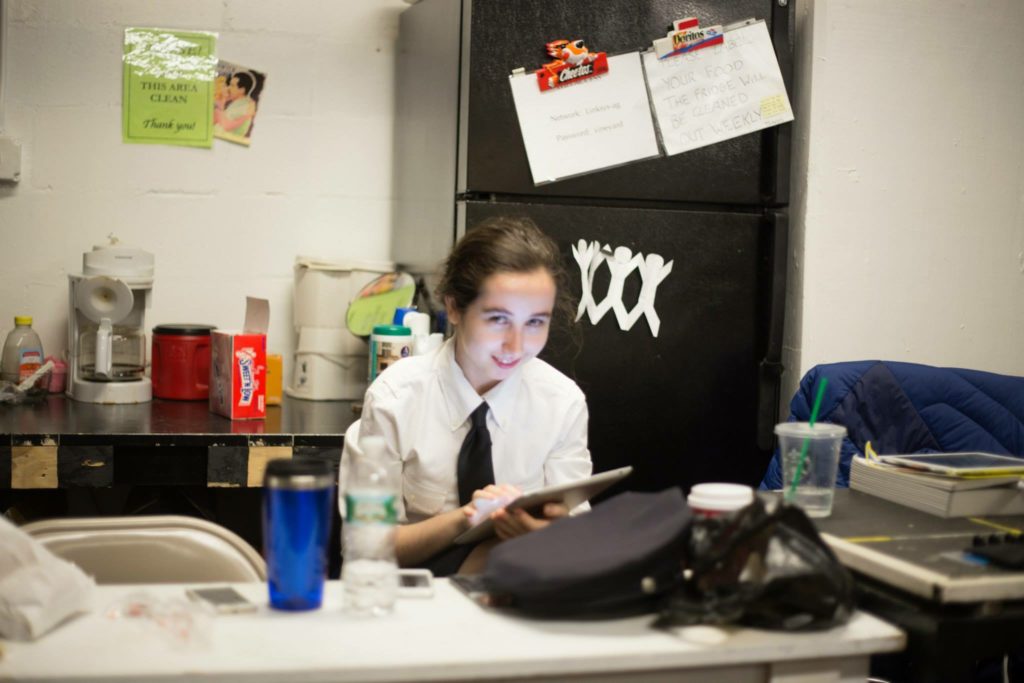
I’ve always loved technology. I explored every setting and pre-downloaded applications on my 2011 Macbook just to know what they all could do. I loved video games, PC and console. I spent every moment I had free online. In fact, I loved being online so much that I often spent moments I didn’t have free online. Check out the photo above: me backstage during a high school play, being caught playing iPad games rather than going over my lines.
As you might have already guessed, tech used to take a backseat to my other interest: theater. I was a total theater kid in high school. You would’ve hated me. I went to pre-professional theater camps and pre-colleges, took vigorous voice and dance lessons, was in every school play, and even the occasional professional show. I didn’t see computer science as an option for me until the summer before my senior year, when I decided much too quickly that theater was too unstable of a career for it to be worth pursuing.
Luckily, I’ve since abandoned that mindset. I’m still studying theater not because I’m certain I can have a career in it, but because it makes me happy. Even better, that small lapse of judgment wasn’t all bad: I gained a computer science major from it!
I’m now a junior at Bryn Mawr College and, yes, I am somehow a double major in computer science and theater. I came to college with absolutely no experience in CS. But I also came to college with a strong belief that CS would work out for me. And, with hard work, it has.
Unfortunately, all this newfound luck and love and curiosity couldn’t save me — and sometimes still doesn’t save me — from a pretty strong sense of imposter syndrome. While I was still learning to love computer science, I felt like I was a double agent or a spy or something, sitting in on CS classes just because no one had noticed I didn’t belong yet.
I recently got over that feeling thanks to a group of 20 amazing young women I met when I was a T.A. with Girls Who Code. I had previously been an intern with GWC, working both for the Strategy and Innovation department and directly for the C.E.O., Ms. Reshma Saujani. Ms. Saujani was probably the best boss I’ve ever had. She taught me about ‘bravery and perfection’ — how young women often pass up being brave and ambitious for the sake of not turning in imperfect work. I conducted research on this topic for her as well as the history of brave women in STEM, but couldn’t digest that bravery for myself until I met my co-teachers and students this last summer.
My students taught me more than I taught them. I know that’s a pretty cliche statement, but it’s true! After all, it’s one thing to teach someone how to write a Python program, but it’s another thing to teach someone how to be brave. In my short eight weeks with them, they were brave enough to send cold emails to people they admired, to throw themselves into projects they’d never done before, and even brave enough to walk right up to an executive and ask how they could work for them.
My students showed me that anything is possible by simply being brave for themselves. Now, for them and for myself, I feel more motivated than ever to love computer science, to actively pursue a career in it, and to believe in myself and my skills. I want to do all I can to put myself in a good position so that I can one day help and empower them in the same way they helped and empowered me.
It’s hard to be brave. I’m still way more comfortable on a stage than improving a program’s efficiency, way more comfortable communicating with a team than coding all by myself, and way more comfortable in a behavioral interview than a technical interview. But I’m working on it — with the support of my Girls Who Code family, I know I can one day become the awesome computer scientist I want to be.
If you’re reading this and have ever felt unsure about yourself or your skills, I want you to know that I believe in you. If I can do it, so can you!
Emily Lobel, 2019 RTC Fellow
Rewriting the Code – Empowering College Women in Tech